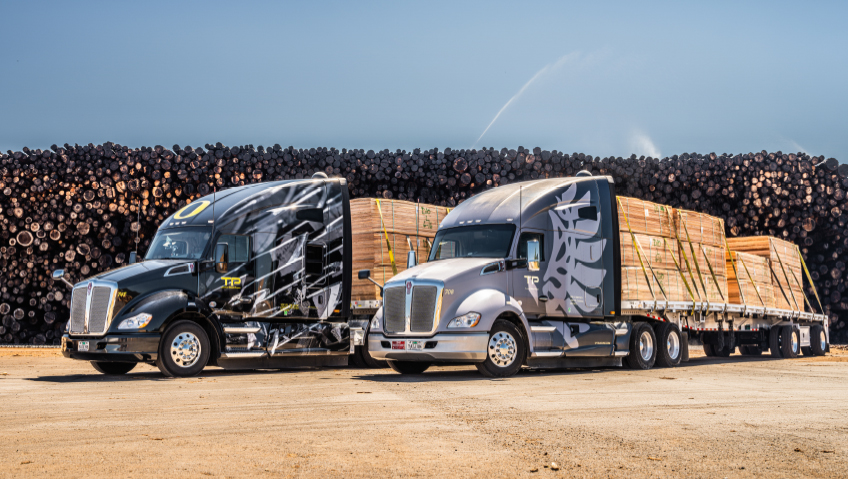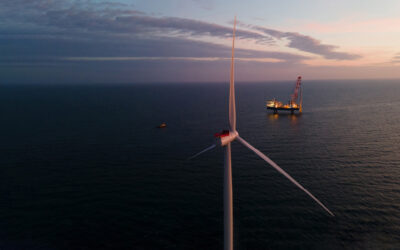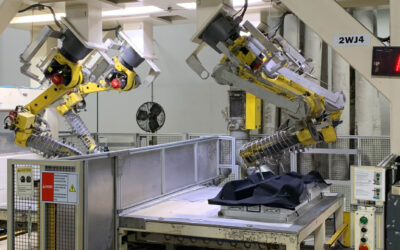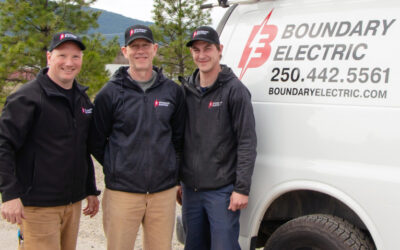With a focus on eco-friendly, environmentally responsible stewardship at every level of its production process, Timber Products Company prides itself on a lengthy, distinguished history along with an ability to continually move forward through adaptation of innovative technology and providing its loyal customer base with quality, customized workmanship.
Founded in 1918, Timber Products not only manufactures a diverse range of wood products — including its signature hardwood plywood — but also owns its own forestland, operates nine manufacturing facilities, and boasts both an international and a nationwide transportation division.
Poised to become a leader in the 10-foot hardwood plywood market in North America with its recent year-long installation of a Meinan lathe at its Yreka, California, facility, Timber Products looks to advance veneer and plywood production through modernization and forward thinking. The lathe investment will help provide the company’s mills with high-quality veneer in the 10-foot line, which translates to more outstanding options for its loyal customers.
“We learned several years ago the importance of the oversized panel, meaning something larger than four by eight has become more critical as kitchens have gotten smaller and taller,” says Doug Clark, Hardwood Sales Manager. “We have the ability to make 10-foot panels at several locations now. It’s an important panel to a lot of our OEM customers that carries a lot of other business along with it.”
The 10-foot press is unique in itself, he adds, and with not many companies offering it, Timber Products stands out a little bit more within the industry. “We’re also getting a 10-foot hardwood plywood manufacturing equipment installed at our Corinth location as well, so we’ll have one on the west and then also on the east for customers,” says Sara Anderson, Sales Manager, West U.S.
The new lathe, a huge, one-of-a-kind project, was manufactured in Japan and is the only one in North America that will peel 10-foot veneer. The Meinan Company — founded more than 60 years ago in Japan — was the first to develop an automated veneer lathe line, and Timber Products will proudly house the first 10-foot lathe line in the world with inline green veneer composing, which eliminates manual stacking of random width veneer.
The installation took close to a year and will soon be operational. “We’ve already manufactured some veneer, just learning a bit how it works, and we should be up and producing veneer for consumption within a couple of weeks,” shares Chris Knowles, Director of Marketing.
Along with continually embracing innovation and technology, Timber Products also focuses on providing stellar customer service, adding value to pieces through the work of skilled engineers and craftspeople dedicated to quality merchandise. With its extensive resources and unique manufacturing capabilities, the company performs all its own lay-ups, sanding, laminating and finishing, employing state-of-the-art equipment. Products are engineered in-house, allowing attention and care to be given from beginning to end.
“Instead of just making plywood panels and shipping them on rail cars or trucks, if there are other things that we can do to get that panel one step closer to either a kitchen cabinet or whatever it is that our customers are building, those are other areas we’re focusing on now,” says Clark. “It might be a cut-to-size part or edge banding for shelving or something along those lines. At several of our facilities we have the ability to take the panel and add some additional value to it. It might be just pre-finishing, but it’s something that makes it a little bit quicker for them to turn that into a receivable.”
The company also places a focus on responsible manufacturing. All the company’s products are created with environmental care at the forefront, working to reduce waste and using no-added formaldehyde (NAF) based resins or ultra-low-emitting formaldehyde (ULEF) resins to reduce emissions. Its award-winning GreenT hardwood plywood is responsibly engineered with an environmentally friendly adhesive, guaranteed to meet the strictest emission regulations in the world.
Timber Products also embraces the conservation of wildlife habitation, striving to develop the quality of wildlife habitat by promoting biodiversity in plant and animal populations. As a major purchaser of U.S. Forest Service and Bureau of Land Management timber, the company works diligently to promote forest health and also reduces fuels that can cause wildfires. Additionally, Timber Products purchases large quantities of fire-killed timber from U.S. Forest Service lands and removes dead fuels in preparation for new forest growth.
“About 50 percent of the volume that comes into our software veneer mill in Yreka comes off of our own timberland that we own there,” says Knowles. “The other 50 percent comes from the open market. We’re in the unique position that California has the strictest environmental regulations in the United States, and of course we comply with all of those and go above those in some instances to ensure we have sustainability in our supply chain.”
Timber Products is one of the few vertically integrated companies out there that still remains, he adds. Historically, if you look in the wood products sector, vertical integration was the way of the industry, but over time a lot of companies have sold off their timberlands to other organizations. Timber Products still controls a large volume of timberlands, growing trees on its own land from seedlings, managing the timber responsibly, harvesting it and then bringing it to its mills. This vertical integration results in cost savings for clients.
“We also have manufacturing capabilities, and we go all the way through the supply chain to the trucking and logistics,” says Knowles. “We’re pretty uniquely positioned in the industry.”
For a company that has been around for more than 100 years, employees still consider it a “family” run business. The addition of Steve Killgore as the new CEO and Mark Avery as COO means it’s a little bit different than when the longstanding Gonyea family ran it, although they’re still very much involved, says Clark.
“The positive attitude and what Steve Killgore brings every day to the company is amazing, along with his experience not only in hardwood plywood but also in the commodity market, softwood and composite. He’s very valuable to the company, and he’s just a team player.”
Although the past year has been uniquely difficult for companies around the world, the issues Timber Products has faced have not only been pandemic-related, but environmentally challenging as well with the onset of the devastating California wildfires.
“They shut down a significant amount of the supply of softwood veneer to make panels and put pressure on that market, and now prices have increased in everything, partly as a result of that,” says Clark, who adds that dealing with various import obstacles from Vietnam, Indonesia, and Malaysia is also extremely tough.
“COVID has definitely also had some negative impacts on us, affecting the way that we do business in general, with limited travel and face-to-face interaction within our own company and with customers,” says Anderson. “It’s just been challenging across the board.”
Personal interactions have been sorely missed during this difficult time, as this century-old company has always relied on building and maintaining relationships, says Clark – something he doesn’t envision changing.
“We go through strong markets and weak markets, and it’s the relationship that we have with our customers that’s the most important,” he says. “We’re not the biggest in any of the categories that we participate in, but to our customers it feels like one-stop shopping, through the relationship that they have with our territory sales managers, with our inside sales folk and with our mill men. We think it’s critically important to get our customers to visit our facilities and really get to know our people.”
In the hardwood plywood business, that part of the business is complex, he adds. With more than 30,000 different SKUs for panels and configurations that can be built, it’s very different than a commodity type market.
“Knowing that a customer is getting the right spec and the right panel and having our folks at the mill getting to know our customers, too, is important. So it really is all about relationships,” says Clark.
Shifting from a family-run business to bringing in professional management has also meant a shift to instilling a different outlook within the company; in the past there was a mentality of sales people focusing specifically on one product line, explains Knowles. One of the things the management team has now done is to have sales people focus more broadly on everything the company does, ensuring that all customers are aware that the company manufactures beyond the one product line.
“We can be, in many ways, that one-stop shop,” he says. “This is particularly something that our distribution customers find of value, because they can come to us and get hardwood plywood, they can get softwood plywood, they can get particle board, or they can get lumber.”
Timber Products also offers an import/wholesale division, so customers can also get their hands on products that Timber doesn’t manufacture. “I think that’s been a really valuable thing for us to adopt over the last couple of years,” Knowles adds.
Looking forward to the coming year and beyond, Timber Products’ manufacturing business is striving to be nimble, says Clark. “Being able to adapt and adjust depending upon market conditions and being able to build the unique panels, such as the 10-foot, or the oddball panels that the large plywood manufacturers don’t want to build is vital. The word nimble comes to mind as we look forward as a company – being able to adapt to different market conditions and changing markets. That’s definitely going to be important.”













